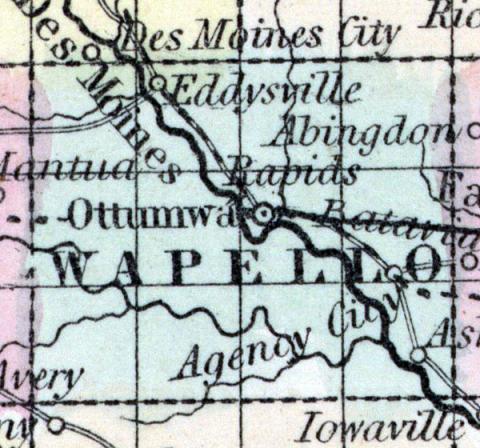OTTUMWA, a thriving post-village, capital of Wapello county, Iowa, on the left bank of the Des Moines river, 75 miles N. W. from Keokuk. Improvements have been commenced on the river, which, when finished, will render it navigable for steamboats. The village is surrounded by a rich farming country. One or two newspapers are published here. (Baldwin's New and Complete Gazetteer of the United States..., 1854)
OTTUMWA. The city of Ottumwa is pleasantly situated on the DesMoines River, at the geographical centre of Wapello County, of which it is the county seat. The name is Indian, and the exact meaning it is impossible to give. Those who pretend to be versed in Indian terms, say it signifies “The place of the lone chief.” Others say that it means “The Rapids," and such appears to have been the idea of the company that laid out the town, as it is said in the articles of incorporation, that the association is entered into “for the better organization of the Appanoose Rapids Company, proprietors of the property or claim, near and adjoining the Appanoose Rapids of the DesMoines River, known by the Indian name of “Ottumwa.”
The Appanoose Rapids Company, in 1842, laid out the town and gave to it the name of “Ottumwa.” The company donated to Wapello County each alternate lot, upon the condition that Ottumwa should be seat of justice of the county. In May, 1844, Joseph B. Davis, of Washington County, John H. Randolph, of Henry County, and Solomon Jackson, of Lee County, who had been appointed by an act of the Legislature, in February, of that year, commissioners to locate the county seat of Wapello County, fixed upon Ottumwa as the point, and located the county seat at this city.
James R. McBette, Urial Biggs, John D. Elbert, Paul C. Jeffries, Thomas D. Evans, Hugh George, David Glass, John Lewis, William Dewey, Sewell Kinney and Thomas Devin, were the individuals forming said company, but two of whom, Paul C. Jeffries and Thomas Devin, now reside here. Some of the very first settlers were Paul C. Jeffries, David Hall, David P. Smith, William H. Galbraith, John Fullen, David Glass, Hugh George, Sewell Kinney and B. A. Spaulding.
In 1844, the name of the new town was changed from Ottumwa to Lewisville, but it retained that name only for a short time, a large majority of the early settlers being in favor of the old name, and the town was again re-named Ottumwa.
On the 15th day of July, 1856, the Legislature of Iowa passed an act incorporating the city, and the first election for city officers was held on the first Monday of April, A. D. 1857. D. F. Gaylord was chosen Mayor, James D. Devin, Recorder, E. Washburn, Treasurer, and John Newman, Marshall.
Ottumwa is, at present the western terminus of the Burlington and Missouri River Railroad, and the DesMoines Valley Road passes through the city, on its way up the valley. The North Missouri is also projected to this point, and the Davenport and Muscatine Railroad Company are agitating the question of extending its road from Washington to this city. Ottumwa has two steam flouring and grist mills; one woolen and carding factory; one foundry and machine shop; two sash, door and blind factories; two furniture establishments; one pork packing house, capable of slaughtering and curing 50,000 head of hogs during the season; two breweries; two rectifying establishments; two brick yards; five hotels; one express office; one National bank; twenty dry goods stores, five of which are wholesale establishments; nineteen grocery and provision stores; three watch and jewelry shops; three photograph galleries; three tin and stove stores; three clothing stores; three drug stores; five shoe shops; four tailoring shops; three millinery establishments; four harness and leather stores; two bakeries; four meat markets; two livery stables; five blacksmith shops; three carriage and wagon shops; one gun shop; one marble shop; two barber shops; two ferries; two lumber yards; eight ministers; ten lawyers; ten physicians; one Episcopalian Society, church in process of erection; one Presbyterian Church; one Catholic Church; one Congregational Church; one Christian Church; one Methodist Church; one Baptist Church; one High School; one Sisters Academy, under the charge of the Catholic Church; five private schools. Ottumwa Lodge, No. 9, I. O. O. F., meets every Tuesday evening. Ottumwa Encampment, No. 22, I. O. O. F., meets the first and third evenings of each month. Clinton Chapter, No. 9, A. F. & A.M., meets Saturday evening on or before the full moon. Ottumwa Lodge, No. 16, A. F. & A.M., meets Thursday night on or before the full moon. Philhistoric Society meets every Tuesday evening. Fenian Brotherhood Society meets every Saturday evening.
The surrounding country is exceedingly fertile and furnishes an abundant supply of wheat, corn, oats, barley, apples, etc. The country is well timbered, there being plenty of hickory, oak, cottonwood, maple, elm, and other forest trees. The bed of the Des Moines and creeks emptying into it, furnish an inexhaustible supply of building stone, and the whole county is underlaid with mineral coal, frequently cropping out, furnishing an abundant supply of that important article.
Ottumwa has two newspapers—the Ottumwa Democratic Mercury, edited by E. L. Burton and H. B. Hendershott, issued every Friday, and the Weekly Ottumwa Courier, edited by J. W. Norris, issued every Thursday. The population of the city is about 3,000.
There is, perhaps no city in the State, of the size of Ottumwa, that can at all compare with it, in a business point of view. For the past four years, it has been the centre of trade for Western Iowa and Northern Missouri. With two railroads completed, and two more in prospect, it bids fair to be the chief city of Southern Iowa. It is rapidly increasing in population, wealth and importance. (Hair's Iowa State Gazetteer..., 1865)

